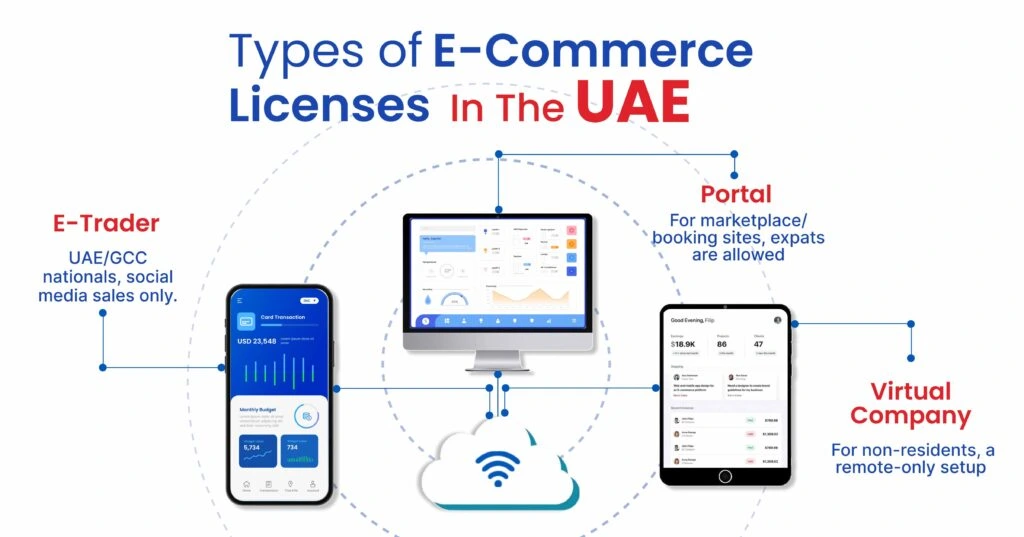Obtaining an e-commerce license in the UAE involves a structured, sequential process designed to ensure compliance and efficiency.
Step 1: Define Your Business Activity
The first step requires clearly defining the specific business category, such as online retail, dropshipping, or digital services. This clarity is crucial as it dictates the type of license and any necessary approvals.
Step 2: Choose Your Jurisdiction
When setting up your e-commerce business, you can choose between a mainland or free zone setup:
- Mainland companies now allow 100% foreign ownership for most activities and offer full access to the UAE market. Ideal for businesses targeting local customers and offering services or retail across the Emirates.
- Free Zone companies also offer 100% ownership, with tax benefits and lower setup costs. However, they are limited to operating within the free zone or internationally unless a local distributor is appointed.
Note: Offshore companies are not eligible for e-commerce licenses as they can not operate within the UAE.
Step 3: Register Your Trade Name
A unique and compliant trade name must be selected and reserved. The name must follow UAE rules, no offensive or religious terms, and align with your brand identity.
Step 4: Prepare Documentation
Gathering all required documents is a critical step to avoid delays. This includes passport copies, tenancy contracts, and initial approvals.
Step 5: Submit Your Application
The application is then filed with the Department of Economic Development (DED) for mainland setups or the relevant free zone authority.
Step 6: Lease Office Space or Virtual Desk
Most UAE jurisdictions require a physical presence. Mainland companies may require a physical office. Free zones offer flexible options like flexi-desks or virtual offices, ideal for e-commerce businesses.
Step 7: Obtain Initial Approval and Pay Fees
After submission, initial approval for the business activity and license is granted, followed by the payment of applicable fees.
Step 8: Apply for Additional Approvals
Approvals depend on the nature of your e-commerce activity. Based on your business model, you may need one or more of the following:
- TRA (Telecommunications and Digital Government Regulatory Authority) – Required for digital communication platforms, online marketplaces, or VoIP-based services.
- Dubai Customs – Mandatory for businesses involved in cross-border e-commerce, importing, or exporting goods.
- Local Municipality or Health Authorities – Needed for specific product categories such as food, cosmetics, supplements, or other regulated consumer goods.
Always check with your licensing authority or free zone to confirm what approvals apply to your specific activity.
Step 9: Open a Corporate Bank Account
This step is mandatory after the license approval and is crucial for facilitating various financial transactions and payment gateways. UAE banks have stringent requirements, necessitating proof of business activity and shareholder documents.
Read more: How to Open a Bank Account in the UAE?
Set up Your Online Platform
After meeting legal requirements, build a secure, user-friendly e-commerce site with trusted payment gateway integration.
This sequential flow emphasizes that each step builds upon the previous one. Thorough preparation at each stage is key to avoiding delays in the structured government process.
Navigating the e-commerce licensing process in the UAE can be intricate. Don’t let the complexities overwhelm you. Let Safe Ledger FZCO handle the entire process, ensuring a smooth and efficient journey to launching your online business in the UAE.












